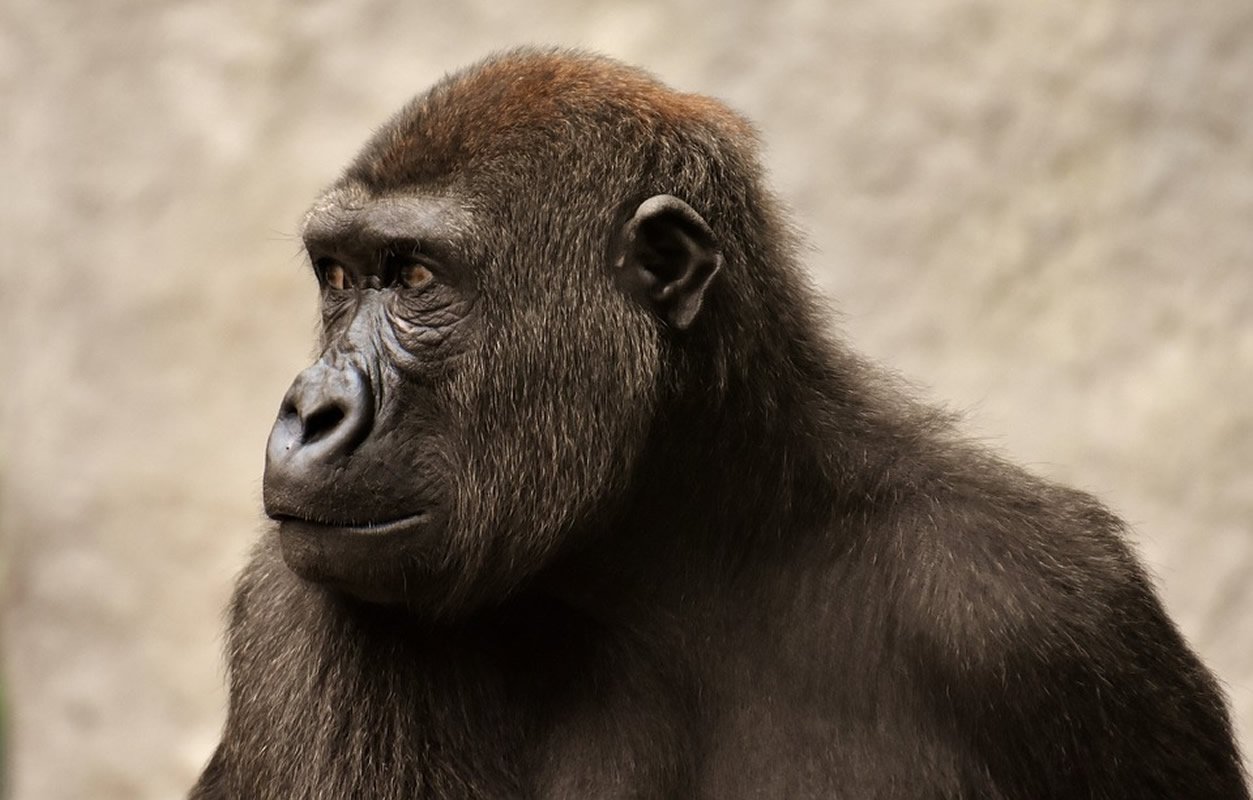Summary: A new study sheds doubt on existing theories of ape social cognition. Researchers argue it is possible apes and humans are equally capable in some aspects of social cognition, such as social signaling. The study concludes it is essential to not just consider evolution, but also environmental factors when researching ape-human differences.
Source: University of Portsmouth
Apes’ abilities have been unfairly measured, throwing into doubt the assumed belief that human infants are superior to adult chimpanzees, according to a new study by leaders in the field of ape cognition.
Researchers studied published work comparing human and ape social cognition and came to the conclusion the studies had got it wrong.
They say it should come as no surprise that apes raised in institutions would not perform well compared with humans raised in western families, especially when tested with western cultural practices, for example, gestures such as pointing.
The study is by Professor Kim Bard, a Comparative Developmental Psychologist at the University of Portsmouth, Professor Bill Hopkins, at the University of Texas MD Anderson Cancer Center, in the USA, and lead author Dr. David Leavens, at University of Sussex.
It is published in the current edition of Animal Cognition.
The researchers argue that it’s possible that apes and humans are equally capable in some aspects of social cognition, for example, social signaling – pointing at a desired object – and scientists have misjudged their abilities because of an underlying bias and poor experimental designs.
They also suggest that without a rigorous, scientific approach to designing experiments and interpreting results, comparative psychology fails to contribute to our understanding of human uniqueness.
Professor Bard said: “Children are taught in primary school how to design a scientific experiment so that the results can be trusted and are reliable, for example, to demonstrate that sunlight is necessary for plants to grow. If you want to know whether sunflowers or tomato plants grow faster in a classroom, therefore, you have to give them equal amounts of sunlight. A bad experiment would be to put all the tomato pots in a dark corner and all the sunflower pots near a sunlit window. You can’t answer the question because the tomato and sunflower plants were treated differently in the amount of sunlight they got.
“In social cognition tests, previous experience with cultural practices, like pointing, enhances performance. What has happened in countless studies comparing human and ape social cognition is the rules of experimental design have been forgotten. Studies have combined experience and species, for example, designing an experiment comparing humans (who, in our culture, have been given pointing experience) and apes (raised without any pointing experience) and then claiming (falsely) to have demonstrated a species difference in social cognition.
“Most studies, comparing apes with human children, for instance, have been poorly designed, with different relevant experiences given to each species, testing them at different ages in many cases, and then claiming to have found a difference in social cognition between humans and apes, but the species haven’t been treated similarly before or during the tests.
“These studies suffer from the same type of prejudice that once existed in studies of human intelligence, which started from a biased position of assuming northern Europeans were innately more intelligent than southern Europeans. We argue the same type of bias is apparent in cross-species studies.”

The researchers say it’s vital scientists realize that environmental experiences vary among humans (both between children and adults, and between people with different cultural experiences) and among apes (also from young to old, and between apes with different experiences).
Examples of the widespread weakness or a ‘pervasive collapse’ in how experiments are being designed and in how the results are interpreted include samples being of different ages, being set markedly different tests, and being tested in different conditions. Time and again, such studies have attributed differences in results to evolutionary history, when the experimental design has not made all other relevant variables comparable.
Professor Bard said: “Historically, many researchers have claimed humans are superior to apes in social intelligence, but the research is based on studies of captive adult apes isolated from European-style social interaction and human (usually children) from rich western cities. These experiment designs are simply not valid for the comparative study of species differences.
“If an ape from an ape orphanage doesn’t appear to understand a communicative signal that western, middle-class humans commonly use, it might not mean the ape is socially less able than a human because there are many non-western humans that also don’t use these signals. To truly understand the abilities of each species, research needs to examine specific individual learning histories within specific ecological circumstances for both humans and for apes.
“We urge researchers to stop using fallacious research designs and reasoning in studies of comparative cognition.”
Source:
University of Portsmouth
Media Contacts:
Kate Daniell – University of Portsmouth
Image Source:
The image is in the public domain.
Original Research: Open access
“The mismeasure of ape social cognition”. David A. LeavensEmail authorKim A. BardWilliam D. Hopkins.
Animal Cognition. doi:10.1007/s10071-017-1119-1
Abstract
The mismeasure of ape social cognition
In his classic analysis, Gould (The mismeasure of man, WW Norton, New York, 1981) demolished the idea that intelligence was an inherent, genetic trait of different human groups by emphasizing, among other things, (a) its sensitivity to environmental input, (b) the incommensurate pre-test preparation of different human groups, and (c) the inadequacy of the testing contexts, in many cases. According to Gould, the root cause of these oversights was confirmation bias by psychometricians, an unwarranted commitment to the idea that intelligence was a fixed, immutable quality of people. By virtue of a similar, systemic interpretive bias, in the last two decades, numerous contemporary researchers in comparative psychology have claimed human superiority over apes in social intelligence, based on two-group comparisons between postindustrial, Western Europeans and captive apes, where the apes have been isolated from European styles of social interaction, and tested with radically different procedures. Moreover, direct comparisons of humans with apes suffer from pervasive lapses in argumentation: Research designs in wide contemporary use are inherently mute about the underlying psychological causes of overt behavior. Here we analyze these problems and offer a more fruitful approach to the comparative study of social intelligence, which focuses on specific individual learning histories in specific ecological circumstances.






